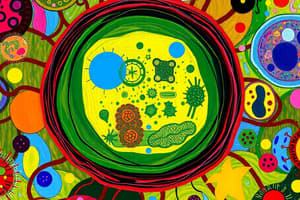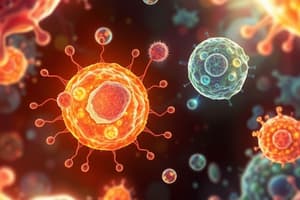Podcast
Questions and Answers
What is cell theory and what are its main tenets?
What is cell theory and what are its main tenets?
Cell theory states that all living organisms are composed of cells, that cells are the basic unit of life, and that all cells arise from pre-existing cells.
Describe the process of photosynthesis and provide its equation.
Describe the process of photosynthesis and provide its equation.
Photosynthesis is the process by which green plants use sunlight to convert carbon dioxide and water into glucose and oxygen, represented by the equation: 6 CO₂ + 6 H₂O + light energy → C₆H₁₂O₆ + 6 O₂.
What is the difference between mutualism and parasitism in ecological relationships?
What is the difference between mutualism and parasitism in ecological relationships?
In mutualism, both species benefit from the interaction, whereas in parasitism, one species benefits at the expense of the other.
What are the three major domains of life and their primary characteristics?
What are the three major domains of life and their primary characteristics?
Explain the role of DNA in genetics.
Explain the role of DNA in genetics.
How does cellular respiration differ from photosynthesis?
How does cellular respiration differ from photosynthesis?
What is homeostasis and why is it important for living organisms?
What is homeostasis and why is it important for living organisms?
List and describe the main systems of the human body.
List and describe the main systems of the human body.
What distinguishes natural sciences from social sciences?
What distinguishes natural sciences from social sciences?
Why is the scientific method considered a structured approach to inquiry?
Why is the scientific method considered a structured approach to inquiry?
How do theories differ from laws in scientific research?
How do theories differ from laws in scientific research?
What role do models play in scientific investigation?
What role do models play in scientific investigation?
What are some ethical considerations researchers must keep in mind?
What are some ethical considerations researchers must keep in mind?
Who was Marie Curie and what was her contribution to science?
Who was Marie Curie and what was her contribution to science?
Discuss the significance of scientific literacy in society.
Discuss the significance of scientific literacy in society.
Explain the importance of variables in scientific experiments.
Explain the importance of variables in scientific experiments.
Flashcards are hidden until you start studying
Study Notes
Biology Overview
- Definition: Biology is the study of living organisms and their interactions with the environment.
- Branches:
- Botany: Study of plants.
- Zoology: Study of animals.
- Microbiology: Study of microorganisms.
- Ecology: Study of ecosystems and the relationships between organisms.
Key Concepts
-
Cell Theory:
- All living organisms are composed of cells.
- Cells are the basic unit of life.
- All cells arise from pre-existing cells.
-
Genetics:
- Study of heredity and variation in organisms.
- DNA as the genetic material; structure includes nucleotides.
- Genes as units of heredity; dominant and recessive traits.
-
Evolution:
- The process by which species change over time through natural selection.
- Common descent and adaptation as key components.
Organism Classification
-
Taxonomy Levels:
- Domain
- Kingdom
- Phylum
- Class
- Order
- Family
- Genus
- Species
-
Major Domains:
- Bacteria: Prokaryotic, unicellular organisms.
- Archaea: Prokaryotic organisms, often extremophiles.
- Eukarya: Organisms with eukaryotic cells; includes animals, plants, fungi, and protists.
Biological Processes
-
Photosynthesis:
- Process by which green plants use sunlight to synthesize foods (glucose) from carbon dioxide and water.
- Equation: 6 CO₂ + 6 H₂O + light energy → C₆H₁₂O₆ + 6 O₂
-
Cellular Respiration:
- Process of breaking down glucose in the presence of oxygen to produce energy (ATP).
- Equation: C₆H₁₂O₆ + 6 O₂ → 6 CO₂ + 6 H₂O + ATP
-
Homeostasis:
- The ability of an organism to maintain a stable internal environment despite external changes.
Human Biology
- Major Systems:
- Circulatory System: Transports blood and nutrients throughout the body.
- Respiratory System: Facilitates gas exchange.
- Digestive System: Breaks down food and absorbs nutrients.
- Nervous System: Controls body functions and responds to stimuli.
Ecological Relationships
-
Symbiosis: Interaction between different organisms.
- Mutualism: Both species benefit.
- Commensalism: One species benefits; the other is unaffected.
- Parasitism: One species benefits at the expense of the other.
-
Food Chains and Webs:
- Trophic Levels: Producer → Primary Consumer → Secondary Consumer → Tertiary Consumer.
- Energy Flow: Energy decreases as it moves up the food chain.
Conservation Biology
- Focuses on the protection and management of biodiversity.
- Strategies include habitat preservation, restoration ecology, and sustainable practices.
Biology Definition and Branches
- Biology studies living organisms and their environmental interactions.
- Botany focuses on plants, Zoology on animals, Microbiology on microorganisms, and Ecology on ecosystems and interspecies relationships.
Key Concepts
-
Cell Theory outlines the fundamental principles of life:
- All living organisms are composed of cells.
- Cells are the basic unit of life.
- All cells arise from pre-existing cells.
-
Genetics explores heredity and variation:
- DNA, the genetic material, is composed of nucleotides.
- Genes, units of heredity, determine traits.
- Dominant and recessive traits influence inheritance patterns.
-
Evolution explains species change over time through natural selection:
- Common descent links all life forms.
- Adaptation occurs as organisms evolve to better suit their environments.
Organism Classification
-
Taxonomy organizes organisms based on their shared characteristics into a hierarchical system:
- Domain
- Kingdom
- Phylum
- Class
- Order
- Family
- Genus
- Species
-
Major Domains of Life include:
- Bacteria: Prokaryotic, unicellular organisms.
- Archaea: Prokaryotic organisms, often thriving in extreme environments.
- Eukarya: Organisms with eukaryotic cells, including animals, plants, fungi, and protists.
Biological Processes
-
Photosynthesis is the process by which plants use sunlight to convert carbon dioxide and water into glucose, releasing oxygen:
- 6 CO₂ + 6 H₂O + light energy → C₆H₁₂O₆ + 6 O₂
-
Cellular Respiration breaks down glucose in the presence of oxygen to produce energy (ATP):
- C₆H₁₂O₆ + 6 O₂ → 6 CO₂ + 6 H₂O + ATP
-
Homeostasis is the ability of organisms to maintain stable internal conditions despite external changes.
Human Biology
- Major Body Systems work together for essential functions:
- Circulatory System: Transports blood and nutrients.
- Respiratory System: Enables gas exchange.
- Digestive System: Breaks down food and absorbs nutrients.
- Nervous System: Controls bodily functions and responds to stimuli.
Ecological Relationships
-
Symbiosis, interactions between different organisms, takes various forms:
- Mutualism: Both species benefit.
- Commensalism: One species benefits, the other is unaffected.
- Parasitism: One species benefits at the expense of the other.
-
Food Chains and Webs represent energy flow through ecosystems:
- Trophic Levels: Producer → Primary Consumer → Secondary Consumer → Tertiary Consumer
- Energy Transfer: Energy decreases as it moves up the food chain.
Conservation Biology
- Conservation Biology aims to protect and manage biodiversity:
- Strategies include habitat preservation, restoration ecology, and sustainable practices.
Definition of Science
- Science is a systematic process that develops and organizes knowledge about the universe using testable explanations and predictions.
Branches of Science
- Natural Sciences study the natural world, including biology, chemistry, and physics.
- Social Sciences focus on human behavior and societies, such as psychology, sociology, and economics.
- Formal Sciences deal with abstract concepts and systems like mathematics, logic, and statistics.
- Applied Sciences apply scientific knowledge to solve practical problems, encompassing fields like engineering and medicine.
Scientific Method
- The scientific method is a structured approach to inquiry, typically involving:
- Observation: Gathering data through the senses.
- Question: Defining a specific inquiry to investigate.
- Hypothesis: Formulating a testable prediction.
- Experimentation: Conducting controlled tests to gather data.
- Analysis: Interpreting data to determine if it supports or refutes the hypothesis.
- Conclusion: Drawing conclusions based on results; can lead to further questioning.
Key Concepts
- Theory: A well-substantiated explanation of a natural phenomena supported by evidence.
- Law: A statement based on repeated observations that describes aspects of the universe.
- Variable: Factors that can change in an experiment categorized as independent, dependent, or controlled.
Important Tools and Techniques
- Instruments: Tools like microscopes and telescopes used to measure and observe physical phenomena.
- Models: Simplified representations of complex systems used to understand and predict behaviors.
- Data Analysis: Techniques (statistical, computational) to interpret experimental results.
Ethical Considerations in Science
- Maintaining integrity, honesty, and transparency in research is crucial.
- Responsible use of resources, considering the impact of scientific work on society and the environment.
Notable Figures in Science
- Isaac Newton: Made fundamental contributions to physics and mathematics.
- Albert Einstein: Developed the theory of relativity.
- Marie Curie: Pioneered research in radioactivity.
- Charles Darwin: Established the theory of evolution through natural selection.
Science in Society
- Science plays a vital role in technological advancement, public policy, health, and education.
- Scientific literacy is essential for informed decision-making and understanding global issues.
Studying That Suits You
Use AI to generate personalized quizzes and flashcards to suit your learning preferences.




